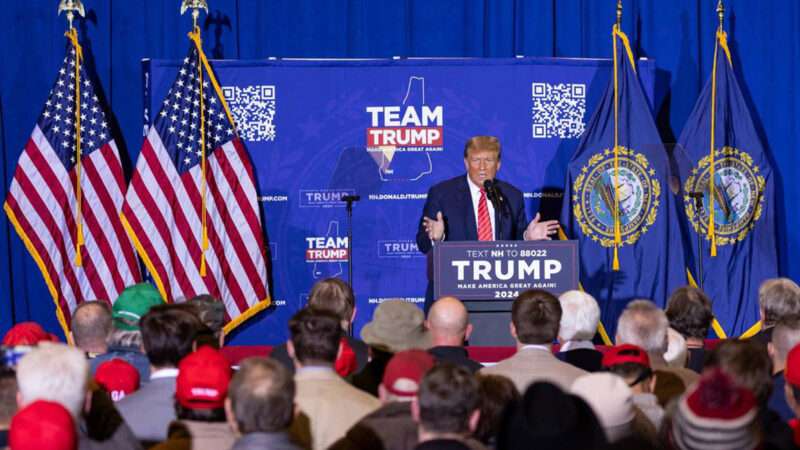
Donald Trump, a longtime admirer of foreign autocrats, recently has been inveighing against the dangers of holding politicians and police officers accountable for breaking the law. If the all-but-certain Republican presidential nominee wants to convince general election voters that there is nothing to charges that he harbors dictatorial ambitions, this is probably not the best way to go about it.
To some extent, Trump's argument that "A PRESIDENT OF THE UNITED STATES MUST HAVE FULL IMMUNITY," as he put it in an all-caps Truth Social post last week, mirrors the position his lawyers have taken in seeking dismissal of federal charges stemming from his attempts to remain in office after losing reelection in 2020. Although a former president can be prosecuted for "purely private conduct," they say, he can be prosecuted for "official acts" only if they resulted in impeachment by the House and conviction by the Senate.
As one judge noted when a skeptical D.C. Circuit panel probed the implications of that position earlier this month, it could literally give presidents a license to kill by ordering the assassination of their political opponents. Trump's understanding of presidential immunity is, if anything, even broader.
"ALL PRESIDENTS MUST HAVE COMPLETE & TOTAL PRESIDENTIAL IMMUNITY," Trump says, even when their actions "CROSS THE LINE" between legitimate exercises of presidential power and criminality. Otherwise, he warns, presidential "AUTHORITY & DECISIVENESS" will be "STRIPPED & GONE FOREVER."
Tellingly, Trump draws an analogy between a former president's criminal liability and safeguards aimed at preventing police officers from violating people's constitutional rights. "YOU CAN'T STOP POLICE FROM DOING THE JOB OF STRONG & EFFECTIVE CRIME PREVENTION BECAUSE YOU WANT TO GUARD AGAINST THE OCCASIONAL 'ROGUE COP' OR 'BAD APPLE,'" he says. "SOMETIMES YOU JUST HAVE TO LIVE WITH 'GREAT BUT SLIGHTLY IMPERFECT.'"
In Trump's view, remedies for police abuse, such as insisting that officers obey the Constitution or authorizing criminal charges and civil rights lawsuits when they don't, are dangerous to public order. Just as presidents should not have to worry about criminal prosecution when they "CROSS THE LINE," he thinks, police officers should not have to worry that they could face charges or litigation simply because they broke the law, and maybe a few heads, while doing their jobs.
Trump has promised to "restore law and order" by indemnifying police officers "against any and all liability." Without such protection, he says, cops are "forced to let a lot of bad people do what they want to do."
That claim is doubly mistaken. Thanks to "qualified immunity," which allows federal civil rights claims against police officers only when their alleged misconduct violated "clearly established" law, suing cops is much harder than Trump implies. And even when victims of police abuse manage to overcome that barrier, officers already are routinely indemnified by their employers.
As Trump sees it, however, accountability is the enemy of effectiveness for cops as well as presidents. That view is consistent with Trump's praise of brutal rulers who take decisive action, unencumbered by statutory or constitutional constraints.
China's leaders "almost blew it" during the Tiananmen Square protests of 1989, Trump told Playboy in 1990, before they realized that maintaining order required a "vicious" and "horrible" response, which "shows you the power of strength." Trump also admires the strength of Russian President Vladimir Putin, whom he described in 2016 as "very much of a leader" with "very strong control over a country."
The following year, Trump bragged about his "great relationship" with Philippine President Rodrigo Duterte, who likened himself to Adolf Hitler while urging the murder of drug users. Trump thought Duterte had done an "unbelievable job on the drug problem."
Trump's notion of strong leadership, like his understanding of what it takes to be an effective cop or president, reflects authoritarian impulses that should repel anyone who values civil liberties and the rule of law. This election is a test of how much voters care about those things.
© Copyright 2024 by Creators Syndicate Inc.
The post Accused of Dictatorial Ambitions, Trump Doubles Down on Authoritarianism appeared first on Reason.com.







